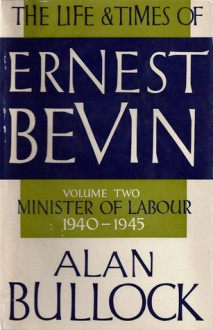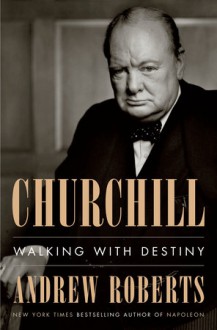
Of the many editorial cartoons drawn by David Low during the Second World War, perhaps the most famous was the one he penned in May 1940 after Winston Churchill formed the coalition government that he would lead as prime minister. Entitled “All Behind You, Winston,” it depicts Churchill at the phalanx of a group of determined men, all of whom are rolling up their sleeves in preparation for the fight ahead. Standing next to the prime minister is Clement Attlee, the leader of the Labour Party and a natural choice that reflected the politically united nature of the coalition. On Attlee’s other side, however, is another large figure, one who almost seems to be crowding past Attlee to stand shoulder-to-shoulder with Churchill. That figure is Ernest Bevin.
On the face of it, Bevin’s inclusion in the front rank is a curious one, as Bevin had just been named minister to what was regarded as a second-rank department and who would not even win a seat in the House of Commons for another month. Yet Alan Bullock makes it clear in his second volume about Bevin’s life and times that such a position was more than warranted, as in his role as Minister of Labour and National Service Bevin played an utterly indispensable role in addressing one of the greatest challenged Britain faced in the war: the mobilization of the nation’s manpower for the drawn-out struggle against the Axis powers.
To have been charged with this responsibility in the coalition government was both unusual and completely understandable. Given that Bevin had never even served in Parliament before, his sudden promotion to ministerial office was nothing short of extraordinary. As the longtime head of the Transport and General Workers’ Union (TGWU), however, Bevin was an ideal choice for the post, especially after the years of poor relations between the labor movement and the British state. Bevin brought instant credibility to his new post, as well as enormous energy and a wealth of new ideas.
First among them was the need to strengthen his position. From the start Bevin insisted on centralizing within his ministry authority over the nation’s manpower. Though he would never gain total control, Bullock shows how Bevin won this fight in the Cabinet. This put him in a prime position to address the competing challenges facing the allocation of manpower from an early stage. Here the core problem was in resolving the competing demands of industry and the military, which often complicated the government’s efforts to run as efficient a system as possible. Bullock’s coverage of this throughout the book illustrates that this was a challenge that was never fully resolved, and could only be managed to the best of his ability. Added to this was Bevin’s reluctance to impose coercion, as he believed firmly that such efforts reduced workers’ efficiency rather than aided it.
Bevin’s views about doing what was best for the worker were a hallmark of how he approached labor problems throughout his time in office. With a career spent fighting alongside as well as for workers, Bevin based all of his positions on his appreciation for their qualities and his assumption of their commitment to the nation’s wartime goals. His efforts to improve conditions for workers earned him considerable goodwill, making it easier (though far from easy) to work out the numerous compromises necessary for maintaining the war effort. Second only to this, though, was Bevin’s interest in ensuring that the British worker was fighting for a better future, and as the immediate crisis ebbed he spent an increasing amount of time concerned with the issues of postwar reconstruction. It was a testament to his stature as a minister that as the coalition came to an end he was approached about succeeding Attlee as the party’s leader – an offer that Bevin firmly declined.
Bullock’s book is so much more than an account of Bevin’s tenure as Minister of Labour. It also describes Bevin’s transition from labor to parliamentary politics, as well as his growing involvement in questions of foreign policy. Though dense with details of wartime initiatives and parliamentary battles, Bullock provides wonderfully clear descriptions of Bevin’s policies and how they worked within the context of the war effort. It makes for a magnificent work that can be read with profit not just by those interested in Bevin’s life or his contributions to the war as Minister of Labour, but by anyone who wants to understand the inner workings of Churchill’s wartime government.

 Log in with Facebook
Log in with Facebook 









